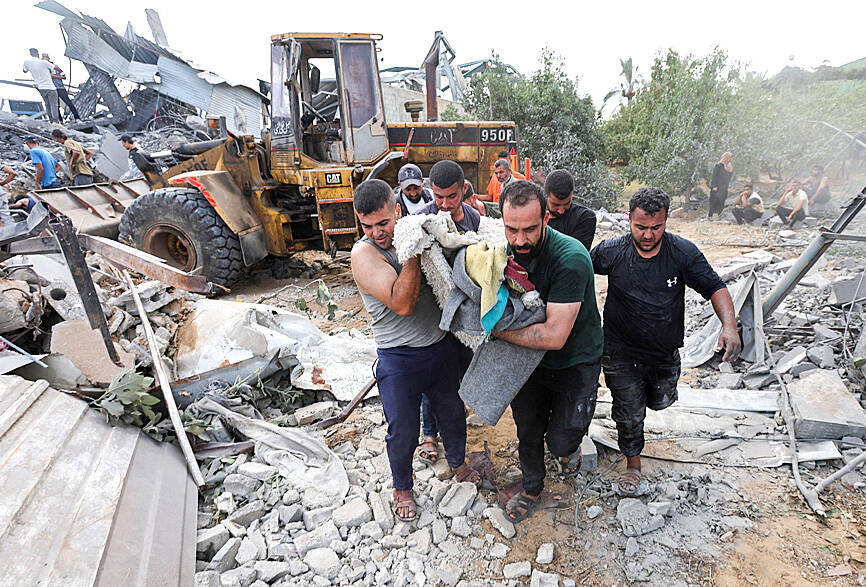Deadly Israeli strikes yesterday hit Lebanon and Gaza as the US secretary of state was set to visit Israel aiming to finalize a Gaza truce agreement that diplomats say could avert a wider regional conflagration.
The Lebanese Ministry of Public Health said an Israeli airstrike in southern Lebanon killed 10 people, including a Syrian woman and her two children.
The strike was among the deadliest in southern Lebanon since the onset of near-daily exchanges of fire between Israel and Hezbollah following the start of the Gaza war in October last year.

Photo: Reuters
Israel’s military said it struck a Hezbollah weapons storage facility.
In Hamas-run Gaza, civil defense rescuers said an Israeli airstrike killed 15 people from a single Palestinian family. The fatalities in al-Zawaida helped push the Gaza health ministry’s war death toll to 40,074.
“We are in the morgue seeing indescribable scenes of limbs and severed heads and children who are dismembered,” said Omar al-Dreemli, a relative.
On Friday, the Palestinian Ministry of Health reported Gaza’s first polio case in 25 years.
An unvaccinated 10-month-old child in Gaza was on Friday diagnosed with highly infectious polio, the ministry said.
The announcement came hours after UN Secretary-General Antonio Guterres called for two seven-day breaks in the Gaza war to vaccinate more than 640,000 children against type 2 poliovirus, which was first detected in the territory’s wastewater in June.
“We are closer than we have ever been” to a ceasefire in the Gaza war, US President Joe Biden said on Friday, although previous optimism during months of on-off talks has so far proven futile.
Yesterday, senior Hamas official Sami Abu Zuhri said that Biden’s comment was an “illusion.”
US Secretary of State Antony Blinken was yesterday to leave for Israel and seek to “conclude the agreement for a ceasefire and release of hostages and detainees,” the US Department of State said.
With a deal “now in sight, no one in the region should take actions to undermine this process,” Biden said.
On Friday, officials said that Hamas would not accept “new conditions” from Israel.
Israeli Prime Minister Benjamin Netanyahu’s office on Tuesday had detailed its conditions for a truce, including “a veto on certain prisoners” being released from its jails.
Jordanian Minister of Foreign Affairs Ayman Safadi, a Western ally, blamed Netanyahu for “impeding attempts to finalize” a deal and urged pressure on him.
Netanyahu has denied being the obstacle to a deal, blaming Hamas.

Right-wing political scientist Laura Fernandez on Sunday won Costa Rica’s presidential election by a landslide, after promising to crack down on rising violence linked to the cocaine trade. Fernandez’s nearest rival, economist Alvaro Ramos, conceded defeat as results showed the ruling party far exceeding the threshold of 40 percent needed to avoid a runoff. With 94 percent of polling stations counted, the political heir of outgoing Costa Rican President Rodrigo Chaves had captured 48.3 percent of the vote compared with Ramos’ 33.4 percent, the Supreme Electoral Tribunal said. As soon as the first results were announced, members of Fernandez’s Sovereign People’s Party

MORE RESPONSIBILITY: Draftees would be expected to fight alongside professional soldiers, likely requiring the transformation of some training brigades into combat units The armed forces are to start incorporating new conscripts into combined arms brigades this year to enhance combat readiness, the Executive Yuan’s latest policy report said. The new policy would affect Taiwanese men entering the military for their compulsory service, which was extended to one year under reforms by then-president Tsai Ing-wen (蔡英文) in 2022. The conscripts would be trained to operate machine guns, uncrewed aerial vehicles, anti-tank guided missile launchers and Stinger air defense systems, the report said, adding that the basic training would be lengthened to eight weeks. After basic training, conscripts would be sorted into infantry battalions that would take

GROWING AMBITIONS: The scale and tempo of the operations show that the Strait has become the core theater for China to expand its security interests, the report said Chinese military aircraft incursions around Taiwan have surged nearly 15-fold over the past five years, according to a report released yesterday by the Democratic Progressive Party’s (DPP) Department of China Affairs. Sorties in the Taiwan Strait were previously irregular, totaling 380 in 2020, but have since evolved into routine operations, the report showed. “This demonstrates that the Taiwan Strait has become both the starting point and testing ground for Beijing’s expansionist ambitions,” it said. Driven by military expansionism, China is systematically pursuing actions aimed at altering the regional “status quo,” the department said, adding that Taiwan represents the most critical link in China’s

‘REALLY PROUD’: Nvidia would not be possible without Taiwan, Huang said, adding that TSMC would be increasing its capacity by 100 percent Nvidia Corp CEO Jensen Huang (黃仁勳) on Saturday praised and lightly cajoled his major Taiwanese suppliers to produce more to help power strong demand for artificial intelligence (AI), capping a visit to the country of his birth, where he has been mobbed by adoring fans at every step. Speaking at an impromptu press conference in the rain outside a Taipei restaurant, where he had hosted suppliers for a “trillion-dollar dinner,” named after the market capitalization of those firms attending, Huang said this would be another good year for business. “TSMC needs to work very hard this year because I need a lot